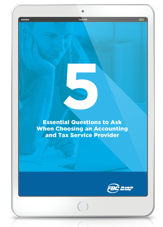Contents
- 1. Income Splitting: A Tax-Efficient Strategy
- 2. The Rules of Paying Salary to Family Members
- 3. Dividends: Tax Savings for Family Shareholders
- 4. Considering Incorporation for Tax Advantages
- 5. Succession Planning: A Tax-Efficient Transition
- Free Guide: Five Essential Questions to Ask Your Accounting or Tax Provider
- About FBC
Last updated: Oct. 10, 2023
Like any business, running a family business in Canada has its rewards and challenges. But a lot of Canadians make it work.
According to a study by the Family Enterprise Xchange Foundation, families own about 65% of Canadian businesses and they contribute 48.9% to Canada’s Gross Domestic Product (GDP), which amounts to $574.6 billion. Across the country, they employ 6.9 million people, which is 46.9 percent of the private sector.
Whether your family business is a small, tight-knit operation or a large enterprise, understanding the tax implications can significantly impact your annual returns.
In this blog post, we’ll delve into five key family business tax facts that could save your family-owned business money during tax season.
1. Income Splitting: A Tax-Efficient Strategy
One of the most effective strategies for reducing your family business tax liability is income splitting. Income splitting allows you to shift income from family members in higher tax brackets to those in lower tax brackets within your family unit.
For instance, if you hire a spouse, partner, or child to work for your family business, the company can deduct the amount paid to them as an expense. Family members report this income on their personal tax returns, often benefiting from lower personal income tax rates compared to individuals in higher tax brackets.
It’s a smart way to optimize your family’s overall tax situation while supporting your business.
2. The Rules of Paying Salary to Family Members
To fully benefit from CRA tax advantages (and avoid penalties), you must establish a legitimate employment relationship with your family members.
If they are hired as an employee, include them on your company’s payroll, issuing regular pay cheques. It’s important to provide a reasonable salary commensurate with what you would pay a non-family member performing the same job. An unusually large salary might be flagged as suspicious by the CRA and could trigger an audit.
Be sure you’re aware of applicable payroll source deductions and other rules established by the Canada Revenue Agency (CRA).
If the family member functions as an independent contractor, ensure they provide invoices for their services each pay period.
If hiring a family member within your business isn’t feasible, another option is to make them shareholders and pay them dividends. Typically, the government taxes dividends at a reduced rate, which offers potential tax savings.
Your business must pay taxes on the money it gives to family members, however, the amount of total tax benefits your family realizes will vary depending on their incomes and the province in which they reside. This approach can be a tax-efficient way to compensate family members who contribute to the business’s success.
4. Considering Incorporation for Tax Advantages
By operating your business through a corporation, you may benefit from a lower tax rate on the first $500,000 of active business income, which can vary depending on where and how your business is incorporated. This combined tax rate ranges from a low of 9% in Manitoba to a high of 12.2% in Ontario. Read our blog “2023 Canadian Corporate Tax Rates and Deadlines” for more information.
Incorporating your family business allows you to retain earnings within the corporation, offering flexibility in how you distribute income, whether as salary or dividends. This can be a smart financial move, particularly when you want to reinvest profits back into the business or plan for long-term growth.
Learn more about the benefits of incorporating your small business in Canada.
5. Succession Planning: A Tax-Efficient Transition
Succession planning is a critical aspect of family businesses, and it can also have substantial tax implications. Properly planned succession can minimize tax burdens while ensuring a smooth transition of ownership to the next generation.
Strategies like gifting shares, using trusts, or implementing buy-sell agreements can all play a role in a tax-efficient succession plan. It’s essential to start planning early to secure the financial future of your family business and preserve its legacy.
Free Guide: Five Essential Questions to Ask Your Accounting or Tax Provider
Most business owners don’t have the time or the technical knowledge to handle all their own administrative tasks. They’re also afraid of making a mistake, only to have the CRA to come calling.
Sound familiar?
You have enough on your plate just keeping up with the day-to-day of your business. That’s why you either hired an accounting or tax provider, or are thinking of hiring one.
Download your copy of “5 Essential Questions to Ask When Choosing an Accounting and Tax Service Provider” to know how to find the right person to help you succeed.
About FBC
With more than 70 years of Canadian tax experience, we offer unlimited tax preparation help, support and tax advice for Canadian business owners. For one flat fee. Our tax experts will run the numbers to create a custom tax return that helps minimize headaches and maximize your tax savings.
Leave your unique tax situation to us. We’ll get you every dollar you deserve. Book online or call us at 1-800-265-1002.



